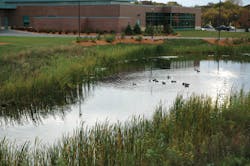The Minnesota Cities Stormwater Coalition
Transforming MS4 Stormwater Permitting in Minnesota
By Randy Neprash
Imagine that you work for a city facing a new environmental regulation — a stormwater permitting program — that is expected to impose additional requirements on your existing city departments. The regulations will be administered by a powerful state agency that your city has dealt with in other regulatory contexts, but the new regulations address unfamiliar territory. You are uncertain and apprehensive about the additional costs and staffing that will be required. Would you want to face this situation alone or would you rather work together with more than 100 cities in your state confronting the same challenge?
This was the dilemma for about 160 cities in Minnesota in 2002, as the state regulator, the Minnesota Pollution Control Agency (MPCA), moved toward issuing the Municipal Separate Storm Sewer System (MS4) General Permit statewide.
Stormwater permitting is a relatively new area of regulation. Stakeholders are working toward effective and cost-efficient approaches to improving and protecting water quality and managing urban stormwater runoff.
Guidance for New Regulations
With its team of highly experienced and respected lobbyists, the League of Minnesota Cities (LMC) has represented the interests of Minnesota cities at the State Capitol for many years. At the suggestion of some of its member cities, LMC proposed a “Guide Plan Project” to help these cities respond to the new regulations. Of the MS4 cities, 119 signed on and contributed funds to the project. A consulting team was hired, and a working coalition of the regulated cities was formed. A steering committee of the participating cities directed the work.
During the Guide Plan Project, the following tasks were accomplished:
• Permit language was negotiated with the MPCA.
• Forms for submittals were created and agreed to by the MPCA.
• Guidance was created so that the cities could create their own Stormwater Pollution Prevention Programs and assemblages of Best Management Practices (BMPs) sufficient to meet the permit requirements.
• A guidebook was created to explain the process and lead the cities through it.
• Sample BMP forms were created in a format suitable for permit submittals.
• Training sessions were held for the cities in various locations around the state.
The process went quite smoothly. In the end, the permit was issued and the cities prepared and submitted their permit materials. The Guide Plan Project won both state and national ACEC Engineering Excellence Awards.
In 2006, the cities that were part of the Guide Plan Project restructured their coalition into the Minnesota Cities Stormwater Coalition (MCSC). Of the approximately 160 regulated cities in Minnesota, about 120 of them have been members of MCSC since then. MCSC remains directly affiliated with the LMC.
MCSC continues to be led by a steering committee composed of member cities. Each member city pays an annual membership fee based on its population. The smallest cities’ annual fee is $410 and cities with populations between 50,000 and 100,000 pay about $1,800. Saint Paul and Minneapolis, the only Phase I MS4 cities, pay $4,500 and $5,500 respectively. MCSC’s annual budget is about $90,000.
At a fundamental level, the formation of MCSC has changed the political equation and working relationship between the regulators and the permitted parties in Minnesota.
Changing the Political Equation
Stormwater permitting is a relatively new area of regulation. Regulators, permitted parties, practitioners, and other stakeholders are working toward finding effective and cost-efficient approaches to improving and protecting water quality and managing urban stormwater runoff. This large exercise includes aspects that are both technical and political. At a fundamental level, the formation of MCSC has changed the political equation and working relationship between the regulators and the permitted parties in Minnesota.
Individual cities, especially smaller cities, can be intimidated by a state agency. That equation changes dramatically when the cities form a coalition. For example, an individual city may be reluctant to raise a technical or policy question with a state agency for fear of drawing attention or eliciting a negative response. Instead, a city can bring its question or issue to the coalition to be raised with the state agency. The individual city is not identified, and MCSC can raise the concern in the broader context of all the issues it covers. In state stakeholder processes, MCSC asks numerous questions and raises issues for all of its member cities.
MCSC’s work has also included:
• Working with MPCA to refine and revise draft permit language for MS4 and construction site stormwater permits.
• Providing a voice for the MS4 cities in numerous state-level stakeholder processes.
• Providing formal comments leading to revised language for complex regulatory and policy processes, such as water quality standards, state rules, and significant TMDLs.
• Setting up an electronic repository where the MCSC member cities can share documents, ordinances, checklists, educational materials, standard operating procedures, and other items.
• Working with the legislature to pass bills such as a statewide ban on coal tar sealant and the Minimal Impact Design Standards.
• Distributing e-mail communication with relevant and detailed information important to MCSC member cities.
• Providing a staff-level “back channel” for discussions with the regulators.
• Promoting funding for urban stormwater research and helping to establish a stakeholder process for identifying and prioritizing research topics.
• Working directly with environmental groups to address and resolve challenges.
• Helping to form the National Municipal Stormwater Alliance, a new national organization comprising state and regional-level coalitions of MS4 permittees.
• Submitting formal comments on federal rules and issues.
MCSC is not a typical organization of regulated parties. The regulated cities in Minnesota recognize the value of the state’s waters and want to protect and improve them. Their goal has been to help make our stormwater regulations meaningful and manageable. They seek to avoid regulations that require cities to waste public funds on paperwork that does not lead to positive environmental outcomes, work that is not cost-effective, goals or requirements that are unreasonable, or BMPs that are ineffective or unsafe.
Shaping Stormwater Permitting in Minnesota
Over the past 16 years, MCSC and the Guide Plan Project have helped shape stormwater permitting in Minnesota. The state’s MS4 cities provide some of the best water quality work in the United States under MS4 permits that are relatively concise and flexible. Compliance with our permits has been strong, with few enforcement actions and many cities going beyond the Maximum Extent Practicable standard. The MPCA and watershed organizations have been partners in this work.
MCSC’s direct affiliation and strong working relationship with the League of Minnesota Cities has been an essential aspect of all this work and success. As the representative organization of the permitted cities, MCSC has become a significant actor in state regulations and permitting because it has administrative expertise, financial resources, and a single staff person with sufficient budgeted time.
To MS4 cities in other states, MCSC serves as a useful model for similar state-level coalitions.
About the Author: Randy Neprash, P.E., is a stormwater regulatory specialist in Stantec’s St. Paul, Minn., office. He is the staff for the Minnesota Cities Stormwater Coalition, an organization of about 120 cities regulated under the MS4 stormwater permitting program. He is a founder and vice-chair of the National Municipal Stormwater Alliance, an organization comprising state and regional-level coalitions of MS4 permittees. He was named the 2014 Professional Manager of the Year for Water Resources by the American Public Works Association.
Circle No. 245 on Reader Service Card


